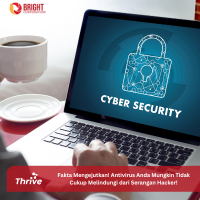We all know the importance of having an antivirus on our computer or device. Antivirus has become a layer protection first against viruses, malware and other malicious programs. However, did you know that antivirus alone may not be enough to protect you from increasingly sophisticated hacker attacks? Many people rely on antivirus as the only security mechanism, when in reality, today's cyber threats are much more complex and diverse. Here are some surprising facts about cyber threats that antivirus alone cannot overcome.
1. Phishing Attacks That Trick Users
Phishing is one of the most effective and dangerous cyber attack methods. By tricking victims through emails, fake websites, or text messages that appear legitimate, hackers can steal sensitive information such as username, password, and credit card information. Even the strongest antivirus often cannot detect phishing attacks because these attacks are more manipulate users rather than infecting the system directly.
2. Malware Berbasis Zero-Day
Zero-day attack is a type of attack that takes advantage of security gaps that are not yet known or have not been fixed by software developers. Because there are no signatures or updates to detect these attacks, conventional antivirus is often unable to recognize them. Hackers exploit these weaknesses to infiltrate systems undetected, steal data, or install malicious software.
3. Difficult to Detect Ransomware Attacks
Ransomware is a type of malware that encrypts data on a victim's device and demands a ransom to restore access to that data. Although some antiviruses can detect ransomware, new attacks and evolving variants make it difficult to completely protect against antivirus alone. Additionally, ransomware often infiltrates via email attachments or malicious links that antiviruses cannot always recognize.
4. Internal Threats and User Error
Not all threat came from outside. User errors, such as using weak passwords or carelessly sharing sensitive information, can also open up gaps for hackers. While antivirus can protect against malware, it can't address human factors, such as clicking on phishing links or entering passwords on fake websites.
5. Unsecure Network Exploitation
Hackers often attack through unsecured networks, such as public Wi-Fi or home networks that don't have proper security settings. Even if you have the best antivirus, if the network you use is not secure, hackers can still infiltrate and access your data. Firewall, VPN, and data encryption are additional protections that are critical to securing communications and data.
6. Social Engineering: Psychological Manipulation
Social engineering is a method of psychological manipulation used by hackers to persuade victims to provide confidential information or take certain actions that open security gaps. This technique does not involve malware or dangerous programs that can be detected by antivirus. For example, a phone call impersonating a bank officer asking for your account information.
7. Vulnerable IoT Devices
Antivirus at computer may not be able to protect IoT (Internet of Things) devices such as smart TVs, security cameras, and other smart home devices. These devices often have security gaps and are rarely updated, making them easy targets for hackers. Without additional security, IoT devices can become hackers' gateway to your home or office network.
Although antivirus is an important element in your cybersecurity strategy, relying on antivirus alone is not enough to deal with increasingly sophisticated hacker threats. Protection More comprehensive ones, including firewalls, data encryption, cybersecurity training, and the use of VPNs, are also indispensable for keeping your data and privacy safe.
Thrive is ready to help you with complete, comprehensive cybersecurity solutions. We provide the best services and protection designed to deal with a variety of digital threats. Contact us now and improve your business cybersecurity with Thrive!




























 Industrial Robotics Integration
Industrial Robotics Integration
 IT Outsourcing Service
IT Outsourcing Service
 Secure Internet SD-WAN Connection
Secure Internet SD-WAN Connection
 Digital Marketing Service
Digital Marketing Service









